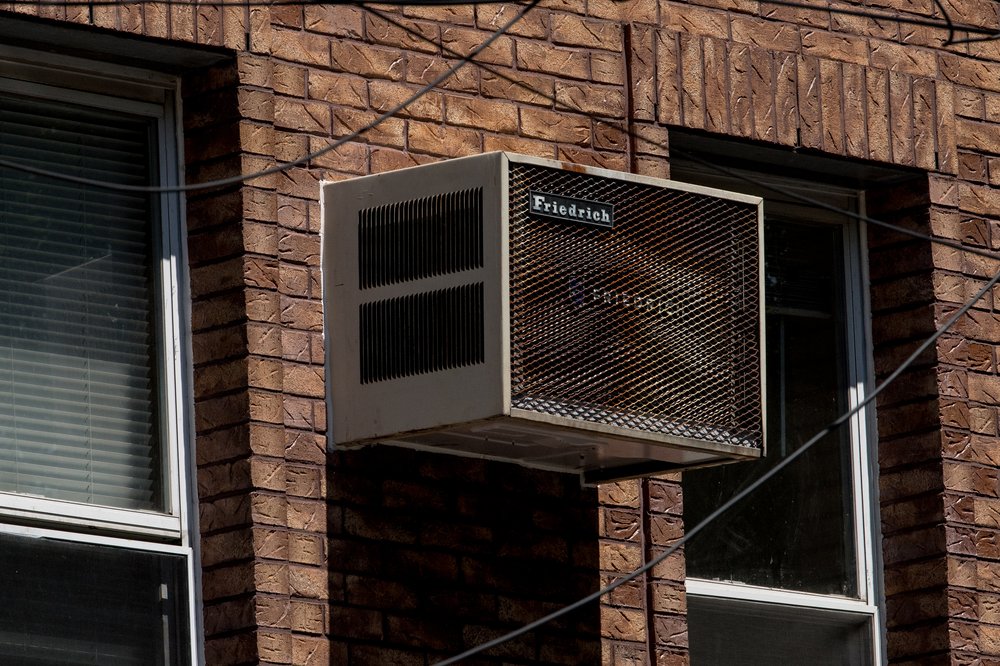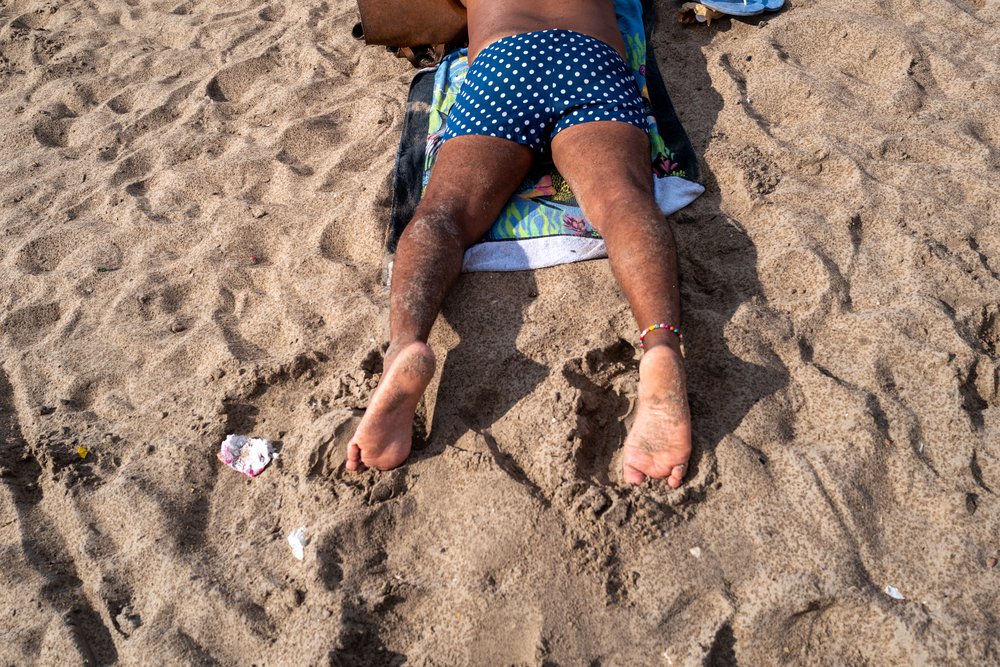Free ACs staved off heat illness for older New Yorkers during pandemic: study
Feb. 10, 2023, 6:01 a.m.
The Get Cool NYC program, which handed out free air conditioners in summer 2020, helped people’s health and revealed barriers to cooling access.

It’s hard to remember in the dead of (an admittedly mild) winter, but summers in 72-year-old Christina Burgis’ Inwood apartment are hellishly hot.
“Dante’s Inferno,” said Burgis, who’s lived in NYCHA's Dyckman Houses since 1972. “When the sun comes in, it’s like a furnace.”
Since 2020, though, she’s had a powerful air conditioner in her two-bedroom apartment — courtesy of the city’s Get Cool NYC program, which distributed the devices to nearly 73,000 low-income seniors during the first summer of the COVID-19 pandemic.
A new study, published Thursday in the Journal of Urban Health, found that seniors who participated in the program were less likely to report feeling sick from the heat compared to those who didn’t participate. They were also more likely than their peers to be able to stay home on hot days.
The findings show how the city can keep older New Yorkers safe in an increasingly sweltering climate, said Katie Lane, the study's co-author and a senior environmental epidemiologist at the city’s Department of Health and Mental Hygiene.
“The study helps point the way forward for climate adaptation planning,” she said. “The city is going to get warmer, so equitable air conditioning access is going to be a critical part of that [plan].”
Get Cool NYC was announced in May 2020 as a way to protect against both heat stress and COVID-19. Along with the free air conditioners, the city also secured $70 million in state aid to help New Yorkers pay their summer electricity bills. NYCHA also temporarily waived the monthly air conditioner fees for program participants. (The agency pays electric bills on behalf of residents in just under 80% of all developments.)
The study identified these fees and the general cost of cooling equipment as why some participants didn’t have an air conditioner in the first place. More than 60% of air conditioner recipients said the cost of the unit itself was prohibitive.
My cooling center was in my apartment, and that was a blessing.
Christina Burgis, Dyckman Houses resident
During heat waves, the city rebrands libraries and senior centers as cooling centers, where New Yorkers can work and relax in air-conditioned comfort. But in the summer of 2020, the centers had capacity limits, and some New Yorkers didn’t feel safe in public.
“Extreme heat is potentially deadly and with COVID-19 keeping more New Yorkers indoors, the risks only increase,” then-Health Commissioner Dr. Oxiris Barbot said at the time.
Burgis credited the program with helping her stay safe at home during a scary time for seniors, who are at especially high risk of both heat-related illness and severe COVID.
“My cooling center was in my apartment,” she said. “And that was a blessing.”
Dangerously hot
New York City’s sweltering summers can be deadly. Heat-related illness sent more than 700 people to the emergency room last year, according to data compiled by the Department of Health. The department also reports that heat stress kills about 10 New Yorkers per year on average, and hundreds more die from conditions exacerbated by the heat, such as diabetes and heart disease. Black New Yorkers and those without air conditioning are at higher risk of dying from heat stress, the report found.
Most New Yorkers have air conditioners at home, but the 10% who don’t are disproportionately low-income. Air conditioners are especially scarce in NYCHA developments, where tenants are charged for installation and pay monthly appliance fees to the housing authority year-round. (Those fees apply to ACs, dishwashers, dryers, washers and freezers.) Without air conditioning, the high-rise buildings can be dangerously warm during the summer.
“This place can really get hot, no joke,” Burgis said of her development. “Someone could actually die in this type of apartment in the summer.”

Poor people and people of color are more likely to live in neighborhoods with little tree cover, meaning they get hotter in the summer. They’re also exposed to more harmful pollution and may have health conditions that make them more vulnerable to heat, said Leslie Vasquez from the community organization South Bronx Unite.
“Our communities are already more sick than anybody else,” she said. “We already have one of the highest asthma rates in the whole country. We can’t even enjoy being in the comfort of our own homes during an extreme heat event.”
A cool program
For the study, the researchers surveyed about 1,500 recipients from the Get Cool NYC program, as well as a comparison group of 900 New Yorkers who were slightly too young to qualify for the program. Both groups answered questions about their air conditioner usage (or lack thereof) and experiences of heat during the summer.
The researchers found that nearly 90% of people who got air conditioners said they were able to comfortably stay home on very hot days, compared to 73% of respondents who didn’t receive units. After weighting the analysis to account for participants’ age and race, the study authors found that the people with air conditioners were three times more likely to say they hung out at home on hot days.
The findings here also suggest something much bigger and more sinister, and that is the disparity in access to air conditioning.
Dr. Charlie Branas, Columbia University epidemiology professor
The air conditioners also helped keep participants healthy, the study suggests. Just one-tenth of the air conditioner recipients reported feeling sick from heat during the summer of 2020, versus more than a quarter of those who went without.
“This program allowed residents who participated to [be] protected both against the effects of extreme heat and COVID-19, when gathering places and places where you would typically go to cool down were closed,” said Siobhan Watson, sustainability and climate resiliency planner at NYCHA.
Barriers to entry
The cost of air conditioners can be a major impediment to owning one — and in public housing, those costs include fees charged by the government. Among study participants living in NYCHA buildings, more than a third specifically named the monthly fees as a barrier to access.
Burgis, the Dyckman Houses resident who received an air conditioner as part of the program, said that she’s once again being charged the monthly fee, which was waived during the study. It runs her about $5 a month.
“It’s not a lot, but it adds up,” she added, noting that she gets charged for other appliances, too. Monthly rent for NYCHA housing runs from $1,699 for a studio up to $3,449 for a six-bedroom apartment.
Charlie Branas, a Columbia University epidemiology professor who wasn’t involved in the new study, praised the work for comparing the experiences of participants to non-participants — something not often found in assessments of government programs, he said. Branas also highlighted the call to action in the study’s findings.
“This study is not just a test of a program,” he said. “The findings here also suggest something much bigger and more sinister, and that is the disparity in access to air conditioning. City policymakers need to put that first. ”
The study authors recommended that the state expand its Home Energy Assistance Program to include summer cooling costs. The program already offers $800 that can be used toward the purchase of an air conditioner and installation costs, but doesn’t offer aid for summer electricity bills.
Burgis called on the city to reroute some funding so it can expand the program to all seniors and low-income families.
“Let’s face it, New York is really not broke — it’s the way they disburse their money,” she said. “[People] shouldn’t have to suffer because they can’t put their money on an air conditioner.”